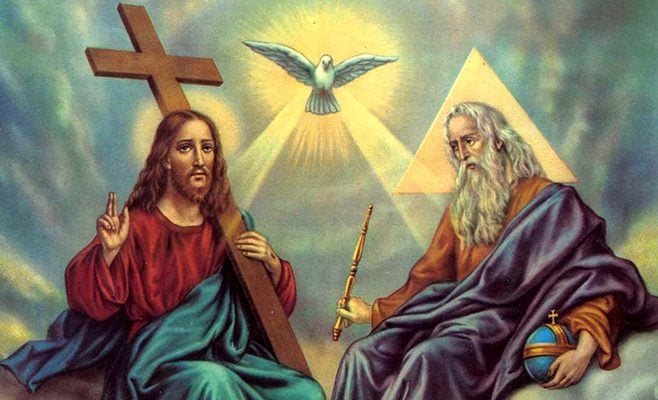
“There is but one unbegotten Being, God, even the Father; and one only-begotten Son, God, the Word and man; and one Comforter, the Spirit of truth.” – Ignatius of Antioch.
Any discussion about God is a discussion about a great mystery. And at the core of this mystery is the rather extraordinary Christian claim that God is a trinity.
In this work, I will endeavor to provide an introduction to this mystery. I will discuss each of the three persons of the Trinity and attempt to explicate their relationship.
Before commencing this work, it is beneficial to explain what Catholicism means by the Trinity. God is one essence (or nature) composed of three persons. Essence or nature is what a thing is. For example, human beings have a human (and thus, rational) nature. God’s essence is Divine. A person is who a thing is. A person can be a male or female, parent, or sibling. In God, the three persons are the Father, the Son, and the Holy Spirit.
The Father
To define something is to limit it. Only then can one make distinctions. This fact leads to an immediate problem in theology. The God of the Bible is infinite. That which is infinite is not confined to time or space. This fact makes an essential definition of God impossible. Because of this fact, any discussion about God often involves the use of analogies. One such analogy is God as Father.
The concept of God as a father is drawn from several sources; I will mention just two. The first is that God is the source of existence itself; God begets creation as a human father begets a child. Still, language fails us. God does not bring the universe into creation as a human father brings a child into the world. Rather, God’s Word is creative, He speaks, and it is done. Evidence of the creative Word of God appears in Genesis, “And God said, ‘let there be light, and there was light.” (Genesis 1:3). This creative Word of God has significant implications with regard to the Son, as we will see below. (Catechism of the Catholic Church, Paragraph 291).
The second source of this comes from Jesus, Who refers to God as the Father (John 5:19-23 and Matthew 6:9).
For Saint Augustine (and later, for Thomas Aquinas), God the Father is the principle without principle. This means that God the Father is not caused or generated by another. This concept of the Father as the principle without principle is essential in understanding the relations between the Father, the Son, and the Holy Spirit. The Trinity is the inner life of God. The Father knows Himself through His reason, and this is Christ. And in knowing Himself, He loves Himself, and this the Holy Spirit.
The Son
The Son of God is, of course, Jesus Christ. The Son is generated by the Father, which constitutes the Person of the Son. As such, Catholicism asserts that Christ is the Second Person of the Holy Trinity.
This is not to suggest that this generation is ontological or temporal. Instead, the Father actively and eternally generates the Son. This is the meaning intended in the prologue of John’s Gospel. “In the beginning was the Word, and the Word was with God, and the Word was God.”
Notice, before the creation, the Son was with the Father. That is to point out that there is no distinction in essence between the Person of the Father and the Son. Furthermore, this relationship between two persons has no beginning in time because it existed before the creation, from all eternity. So, while the Father and the Son are distinct in personhood, they are one with regard to their Divine essence.
The Father and the Son actively spirate the Holy Spirit into the one relation within the inner life of God. Spirated, not generated, because the Father and Son are already constituted as persons concerning each other in the first two relations. For this reason, the Catechism teaches that “The second person of the Blessed Trinity is Son only in relation to his Father.”
The Holy Spirit
The Holy Spirit is the love between the Father (who is the lover) who knows and loves Himself (who is the Son as the beloved). Because of this fact, the Holy Spirit is spirated of the Father and the Son, constituting the Person of the Holy Spirit.
Put differently, the Holy Spirit proceeds from the Father and the Son, but not in a generative sense, but a spiration. “Spiration” comes from the Latin word for “spirit” or “breath.”
In John 20:22, Jesus is said to have “breathed on them, and said to them, ‘Receive the Holy Spirit.’ Scripture reveals the Holy Spirit as pertaining to “God’s love [that] has been poured into our hearts” (Romans 5:5).
As said above, the Holy Spirit is the reciprocating love of the Father for the Son and the Son for the Father (John 15:26). Thus, the Holy Spirit’s procession is not intellectual and generative but has its origin in God’s will and the ultimate act of the will, which is love.
Conclusion
In understanding God (which cannot be completely done), we recognize that the Father is the first principle of life, and the Son is the knowing one who proceeds from the Father. Finally, the Holy Spirit – the willing one – is the bond of love between the Father and Son and therefore proceeds as love from the Father and Son.
It can be helpful to understand the three persons of the Trinity by virtue of their work. For example, the Father in creation, the Son in Salvation, and the Holy Spirit at Pentecost. Once again, however, we cannot divorce the work of one Person of the Trinity from another as they are one in essence. “Because it does not divide the divine unity, the real distinction of the Persons from one another resides solely in the relationships which relate them to one another” (Catechism of the Catholic Church, Paragraph 255). Put another way, the Father reveals the Son, the Son reveals the Father, and the Holy Spirit reveals the Father and the Son.
For this reason, the Catechism states, “The divine Persons are also inseparable in what they do. But within the single divine operation, each shows forth what is proper to him in the Trinity, especially in the divine missions of the Son’s Incarnation and the gift of the Holy Spirit.”















